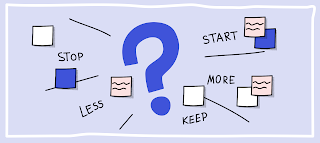A look back at 2022 - Part I
Happy New Year fellow learners and ponderererers (that's spelled right, right? 😜)
Looking back, 2022 seems like an academic blur. I know that lots of things happened, and I've jotted all of them down on a notepad so I can add them to my CV as some point in the future, but as I look back five distinct threads (points of pondering) come up as trends that emerged, or became more clear, in 2022. As I started writing this, it seemed like the length was getting out of hand, so I decided to break it up into many different blog posts. My first point of pondering is...
A deluge of peer review requests...
Alright, maybe "deluge" might be a bit overdramatic, but it does feel like requests for peer review increased in 2022. I've been peer reviewing since 2012 and I am not sure what exactly changed. Did someone see my publons/WoS/ORCID profiles and decided to add me to their regular reviewer's circle? Did the addition of a doctorate to my credentials make me more visible? Was it the reported crisis in peer review that was making the rounds in 2022 that impacted those who were still reviewing? Was it all or some of the above? I don't know! What I do know is that the number of requests I received increased, and the number of declines on my part also increased. My two most common causes were "lack of time" and "I am not able to adequately assess this".
For the second reason, I noticed that I was getting requests for things that I am not necessarily an expert (or familiar) with, but they do fall under the general heading of "pedagogy." Hence, I received requests like one asking me to assess papers that dealt with PE class (aka "gym class") which isn't something I feel confident reviewing. I also received requests for reviews for papers that seemed to be Media Comparison Studies, or papers authored by folks new to online education (usually in a non-western context) that seemed to be rehashing research from the past 20 years. These latter two categories I totally noped out of. Prior to 2022, I would have entertained these two kinds of papers (keeping in mind that I didn't get that many requests) so I could at least give people some feedback.
This past year, for better or for worse, my relationship with peer reviewing changed, and I think that I started thinking about it more selfishly. If I saw an article that piqued my interest, I'd agree to review it (provided that I had time). If I saw something that I would most likely reject (based on the abstract), I decided to not review. I think that if folks are in a tenure track position this kind of service to the profession is paid for by the university. In my case, as an occasional adjunct, I am not compensated for this effort, so my only compensation is choosing things to read and review that are of personal interest to me (which happens in my non-work time). I don't think paying reviewers for reviews would do the trick. I honestly don't know how that would even be calculated. Peer review has issues, something which I have brought up in the past, and something that recently resurfaced in my social media threads (a blog topic for another day), so I don't know how adding payment for reviews would solve anything. It may, in fact, make things worse because the economic incentive to undertake reviews, even when you might not be an expert in the field, just muddies things up.
In any case, looking ahead at 2023, it seems like I'll need a better game plan for peer review requests and figuring out where this kind of activity fits in my professional and academic life. I do wonder, how do non-tenure folks deal with such requests for peer review?



Comments